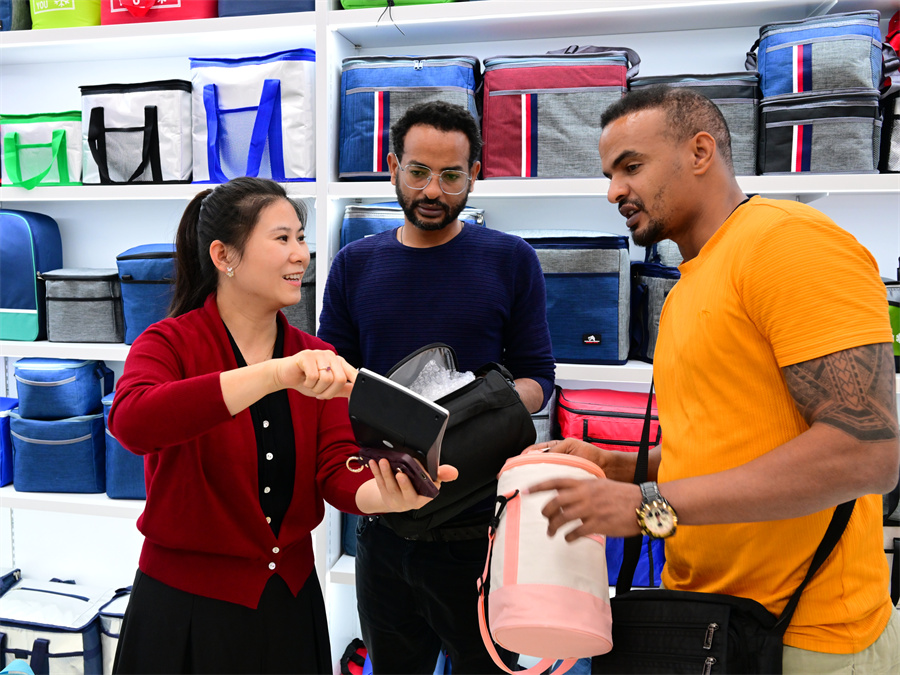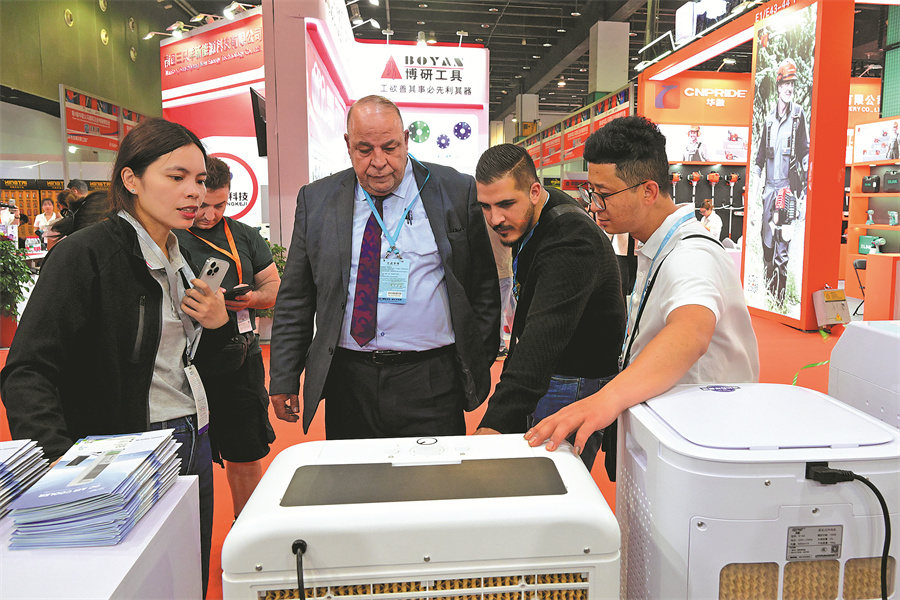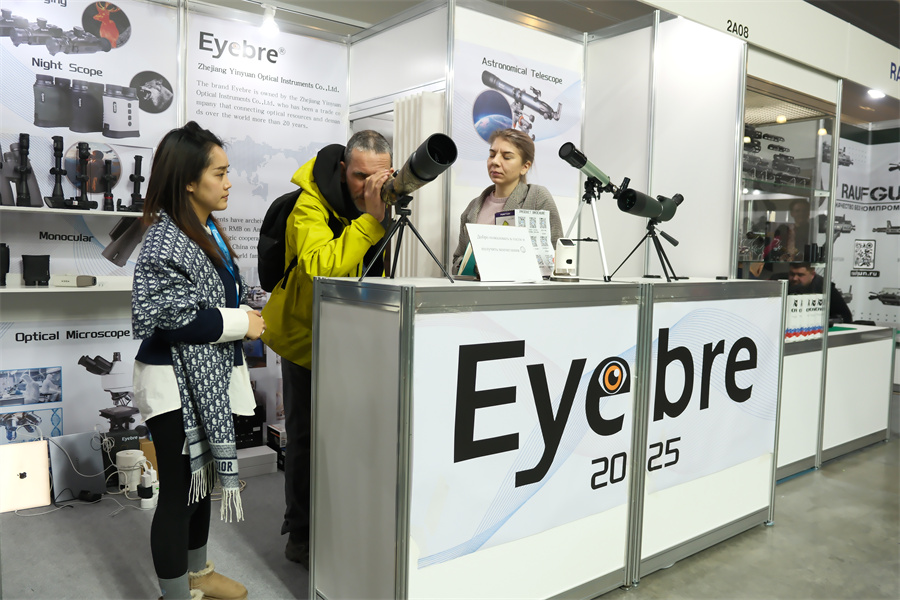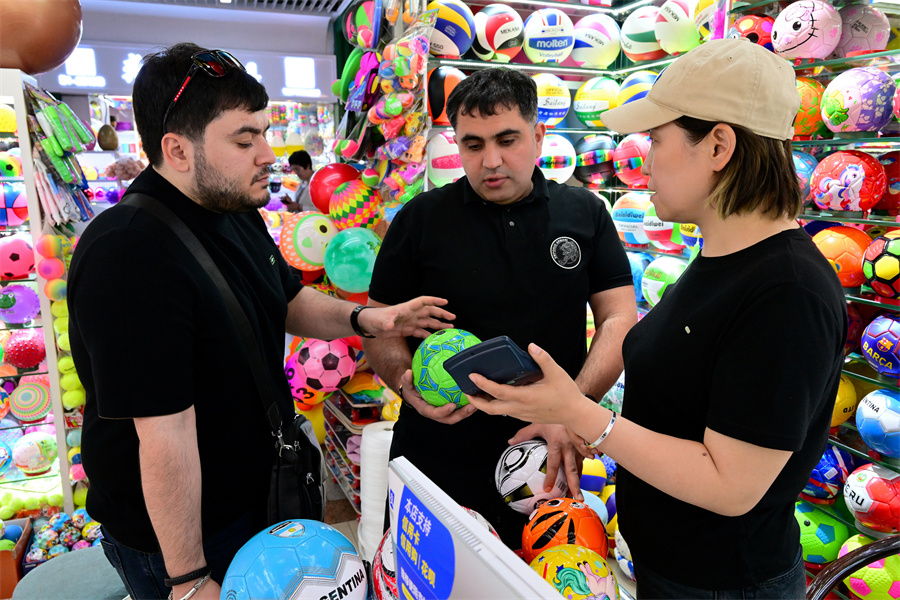


A merchant demonstrates a toy camera to a Spanish trader at Yiwu International Trade Market in Jinhua, Zhejiang province, on April 15.[SHI BUFA/FOR CHINA DAILY]
While the United States' unwarranted imposition of tariffs has strained the nerves of traders around the globe, merchants in Yiwu, Zhejiang province, are confident their exploration of diversified export markets over the years will shield them from any heavy impact.
Known for its "small profits, quick turnover" model, Yiwu International Trade Market is renowned as the world capital of small commodities. The market consists of five districts housing 75,000 stores, with over 3,000 of those exporting merchandise to the US.
Yiwu Yexin Electronics began operating in the market in 2010 and currently has four stores across the districts. Company sales manager Mao Yeqiang said like many operators in the market, they follow a "store in the front, factory in the back" model and mainly export wearable products such as headphones and smartwatches to Europe, Southeast Asia and South America.
This year, Southeast Asia will account for 60 percent of their exports, and Europe about 30 percent. "US orders were normal last year, but this year they've nearly vanished, dropping from 10 percent to far less," Mao said.

A merchant negotiates prices for insulated bags with Ethiopian traders at the market on April 15.[SHI BUFA/FOR CHINA DAILY]
Although they had plenty of orders early this year, April has been noticeably quieter compared with previous years. A direct impact of the tariff war has been the sharp decrease in order volumes, he said. Bulk orders of thousands, or tens of thousands, of units have dropped to just dozens.
Mao said the drop in volume is due to several factors.
"The overseas supply chain for these products is nearly saturated," he said. "After COVID restrictions were lifted demand exceeded supply, but now it's the opposite. Plus, due to economic uncertainties and exchange rate fluctuations brought by the tariff war, foreign buyers are more price-sensitive and prefer placing smaller orders."
To adapt to changes in the trade landscape and the US tariffs, Mao said Yexin Electronics is shifting from a business-to-business model to a business-to-customer one.
"We used to be an OEM (original equipment manufacturer), but now we're building our own brand with unique product features," he said. "We're also exploring other markets like Russia and South America, and considering domestic sales. Local sales require changes in packaging and compliance with domestic standards, making overseas markets comparatively easier to navigate," Mao said.
During the interview with China Daily, Ecuadorian importer Marlon Duche and his team were at Yexin Electronics asking about the prices of travel chargers. Yexin was the first store Duche visited on his Yiwu trip, but he said he would compare prices at other outlets. When asked about the impact of the tariff war initiated by the Trump administration, Duche said, "We're from Latin America, so the tariffs don't impact us at all."

Overseas traders learn about air coolers during an electrical appliance fair in Yiwu on April 20. [SHI BUFA/FOR CHINA DAILY]
Opportunity from crisis
The shelves at Yiwu Lincy Lock Industry Co are filled with traditional and modern smart locks. Founded in 2012 by general manager Lin Xiaoming, Lincy now exports over 50,000 locks daily, and is experiencing double-digit annual growth in production and market share.
In the past, two of its traditional locks were very popular in the US, with monthly exports of 300,000 units each. But following the US tariff announcement, the import cost for US buyers has jumped to 165 percent, prompting a halt in exports.
"We've essentially stopped trading with the US," Lin said. "The US used to account for 30 percent of our exports. Over the past few years, this has dropped to under 1 percent. Fingerprint-activated lock exports to the US have also dwindled due to their complex import requirements and order uncertainties."
Despite the drop in exports to the US, Lin is unfazed by the situation. "We are not fixated on the United States," he said.
"This is just a temporary minor difficulty, which we will rely on transformation (of markets) to overcome. If everyone ignores the United States, and all of Chinese manufacturing ignores the United States, what can the United States do? "
Africa and the Middle East now make up 60 to 70 percent of Lincy's exports, Lin said.
"In many African and Middle Eastern countries, our brand recognition is high — market share ranges from 50 percent to 90 percent," he said. "Word of mouth keeps us going. The US is just a small market for us, we can grow bigger in other regions such as Belt and Road countries and regions."
Lin recently returned from Kazakhstan and Uzbekistan, where he joined a Jinhua city business delegation seeking to deepen economic cooperation.
Inspired by the trip, he plans to develop lock models tailored to local preferences. He has already designed three new models for the Central Asian market.
"I hope to deepen and slowly cultivate this market," he said.
"Crises can reveal opportunities. The tariff war has forced us to abandon the US market, but it gives us more energy to expand elsewhere — especially in Africa, the Middle East, and Belt and Road countries. The world is vast, and if you understand your customers, the market opens up. Even if we stop selling to the US, there are countless other markets to grow into."

Chen Jiajia (left), general sales manager of Zhejiang Yinyuan Optical Instruments Co, looks on as Russian visitors check scopes at an outdoor expo in Moscow on March 1.[CHINA DAILY]
BRI benefits
In 2024, Yiwu's total import and export trade with Belt and Road partners reached 413.34 billion yuan ($56.62 billion), up 18.2 percent year-on-year, accounting for 61.8 percent of the city's total trade, and making it a key growth driver, official data shows.
Chen Fangfang, chairwoman of Hui-Gang Import &Export Co, also joined the business delegation to Central Asia. Her textile company specializes in bedding and carpets, with a daily output of 40,000 to 50,000 blankets.
Chen has been in the industry for 25 years and joined Yiwu International Trade Market in 2011.
"Our foreign trade started with South America. Now our main markets are South America, the Middle East, and some of Europe," she said.
"The US accounts for about 20 percent of our business. But this year, American clients halted orders due to high tariffs. Even European clients are holding back due to the poor economic climate."
Despite challenges from the US and Europe, Chen said South America, the Middle East, and Africa remain stable.
"The tariff war has affected us, but not our survival. Seventy percent of our business comes from other countries. We've never focused on just one country — we develop multiple markets and go on international visits every year," Chen said.
She said the first step is research and development, starting with the raw yarn "so we control the supply chain". The second step is to gain market advantages through innovation. Finally, the company has the benefit of 25 years' experience in the field, Chen said.
"We tell our team to stay grounded and build strength internally, attracting quality clients through innovation, not desperation. Sustainable growth requires both quality and quantity," Chen said confidently.
Wu Xiaoming, chairman of Yiwu Aokay Sports Goods Co, which makes basketballs, footballs, and volleyballs, began diversifying the company's markets following the 2008 global financial crisis.
Average annual company sales total 30 to 40 million yuan, with 50 percent to South America, 20 percent to Western Europe, and the remainder to Africa, Southeast Asia, and Eastern Europe. US exports dropped from 2 percent last year to zero this year, Wu said.
"The US market has high barriers, and mature supply chains, which make it hard to break into. We still have a leftover Walmart order of over 30,000 balls from last year, but due to shipment delays and increased tariffs, it's uncertain whether we'll complete it," Wu said.
Nonetheless, he said the US tariffs had disrupted global trade. "Some of our old South American clients are hesitant to place orders now due to exchange rate volatility," Wu said.
The company has also initiated brand differentiation.
Aokay is the high-end line, Meik is geared for schools and the general public, and Ruimeng (RM) is its budget label. "We used to focus on OEM, but now we're prioritizing brand development," Wu said.

Azerbaijani traders inspect sports equipment at the market on April 15.[SHI BUFA/FOR CHINA DAILY]
Disruption minimal
Zhejiang Yinyuan Optical Instruments Co makes optical products like binoculars, scopes, and night-vision gear, with an annual output value of around 80 million yuan.
Exports to the US account for 40 million to 50 million yuan of its output. Their outlet in Yiwu market sees less than 5 percent of its exports go to the US, but their sales through Amazon are mostly US-bound.
"Through traditional channels, importers handle customs, so we're not directly impacted," general sales manager Chen Jiajia said. "But higher tariffs mean higher shipping costs, which push up prices. In e-commerce, the effect is delayed, but if tariffs stay high, orders will likely decline."
She said if the tariff war continues, the company will absorb some cost increases and raise prices when needed. "Ultimately, US consumers will pay more. It's not beneficial for them," Chen said.
She recently went to a Hong Kong trade fair and said almost no US clients attended. "Since COVID, the US economy has been declining year by year," she said. "When we participated in exhibitions this year, we didn't consider the US and went to Russia or other places. We're now targeting South America, which is showing great potential."
Wu Guangyao, general manager of Wokali (Zhejiang) Biotechnology Co, runs a cosmetics business that joined the market in 2005.The company exports shampoo and other personal care products to nearly 200 countries. US buyers account for less than 10 percent of their exports, but the tariffs have already had a noticeable impact.
"We import raw materials like witch hazel extract and carbomer (a synthetic polymer) from the US, and prices have doubled … but they are even more after suppliers raised prices," Wu said.
Wokali began storing up on US raw materials a month before the tariffs hit — enough for a full quarter of production. But storage limitations, like temperature requirements, prevent them from stockpiling for a full year.
"Our bottleneck is raw materials — we can't change formulations overnight. Some R&D can take three to five years. We're now seeking alternative suppliers from other countries," Wu said.
However, an upside is the brand is well-known in many countries. "Though the US market is affected, global exports remain stable. If we lose the US, we can make up for it with growth elsewhere," Wu said.
Walking through Yiwu International Trade Market, foreign buyers are everywhere, merchants have their doors open, and business is bustling. Although some US clients are hesitant, most Yiwu merchants believe tariffs have not caused significant disruption.
Expanding markets, improving quality, building brands, and continuous innovation were common themes expressed by many traders. In the face of uncertainty in global trade, Yiwu's merchants are embracing long-term thinking and steady progress.

Rare glossy ibis returns to north China wetland after 15-year absence

Nadam fair opens with equestrian shows in Inner Mongolia, N China

Laixi city in E China transforms abandoned mine pit into resort to promote ecology

Scenery of mist-shrouded eastern royal tombs of Qing Dynasty in Zunhua City, N China

点击右上角![]() 微信好友
微信好友
 朋友圈
朋友圈

请使用浏览器分享功能进行分享
